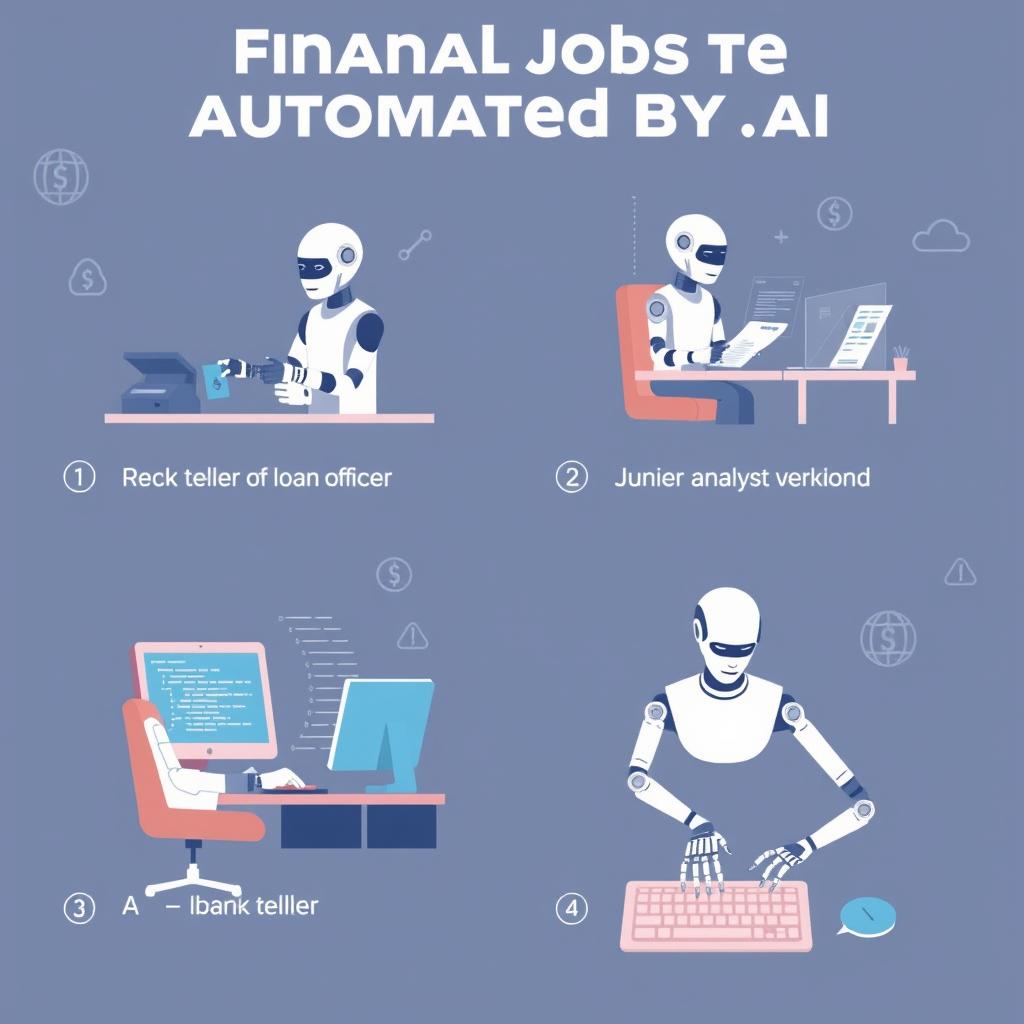The question echoes in the halls of investment banks, accounting firms, and corporate finance departments worldwide: Will AI replace financial jobs? For years, this has been a topic of intense speculation, but as we move through 2025, it’s no longer a distant hypothetical. Artificial intelligence and new technologies are not just knocking on the door of the finance industry; they have kicked it wide open and are actively reshaping its very foundation.
The narrative, however, is not one of simple replacement but of profound transformation. While it’s true that certain roles are facing obsolescence, a new landscape of opportunity is emerging for those willing to adapt. This isn’t about humans versus machines; it’s about humans augmented by machines. Understanding this shift is critical for survival and success in the new financial era.
This comprehensive analysis will explore the truth about AI’s role in the finance sector. We will delve into how AI and new technology are reshaping finance careers, identify the specific jobs that are most susceptible to automation, and shed light on the exciting new roles being created. More importantly, we will provide a roadmap for finance professionals to not only survive but thrive amidst this technological revolution.
The Current State of Play: AI’s Deep Integration into Finance
To understand the future, we must first grasp the present. AI is already a workhorse in the financial sector, performing tasks with a speed and accuracy that humans cannot match. The integration is widespread and growing more sophisticated by the day.

- Algorithmic Trading: High-frequency trading (HFT) firms have used algorithms for decades, but modern AI takes this to a new level. Machine learning models can now analyze vast datasets—including market data, news sentiment from social media, and geopolitical risk factors—to predict market movements and execute trades in microseconds. These systems can identify complex patterns that are invisible to the human eye. Fraud Detection and Security: Financial institutions lose billions to fraud annually. AI systems are the front line of defense. They learn the normal transaction patterns of a customer and can instantly flag anomalies that suggest fraudulent activity, such as a purchase in an unusual location or a series of rapid, strange transactions. This real-time analysis has drastically reduced fraud rates and protected consumer assets. For more on this, you can explore in-depth reports from firms like McKinsey & Company on AI in risk management
Credit Scoring and Lending: Traditionally, credit scores were based on a limited set of historical data points. AI models now create much more nuanced and predictive credit risk assessments by analyzing thousands of variables, including cash flow patterns, utility payments, and even online commercial activity. This allows for more inclusive lending to individuals with “thin” credit files and more accurate risk pricing for lenders. - Robo-Advisors: Platforms like Betterment and Wealthfront use algorithms to create and manage diversified investment portfolios for clients at a fraction of the cost of a traditional human advisor. They automatically handle rebalancing, tax-loss harvesting, and risk assessment based on a client’s stated goals and risk tolerance.
- Process Automation (RPA): Robotic Process Automation is used for countless back-office tasks. Think of software “bots” that handle data entry, invoice processing, compliance checks, and report generation. This frees up human employees from repetitive, mundane work to focus on higher-value activities..
The Truth About AI Taking Over Financial Jobs
So, we return to the core question: Will AI replace financial jobs? The answer is a nuanced “yes, and no.” AI is not leading to a wholesale replacement of the finance professional. Instead, it is causing a fundamental task-based restructuring of jobs. It excels at routine, data-intensive, and rule-based tasks. The roles most in danger are those composed primarily of such tasks.
Financial Jobs AI Will Likely Replace or Heavily Automate
Here is a list of roles where AI and new technology are making the most significant inroads, leading to either a drastic reduction in workforce needs or a complete overhaul of the job description.
Data Entry Clerks: This role is arguably at the highest risk. The primary function of manually inputting data from invoices, forms, and statements into a system is being rapidly automated. Optical Character Recognition (OCR) technology, powered by AI, can now read and interpret documents with near-perfect accuracy, feeding the data directly into accounting or ERP systems.
Bookkeepers and Accounting Clerks: Many core bookkeeping tasks—such as transaction categorization, bank reconciliation, and generating financial statements—are now standard features in AI-powered accounting software like QuickBooks, Xero, and FreshBooks. While oversight is still needed, the manual, time-consuming aspects of the job are disappearing, reducing the need for large bookkeeping teams. Financial Analysts (Junior Roles): The traditional work of a junior analyst—gathering data from various sources, populating Excel spreadsheets, and performing basic financial modeling and valuation—is ripe for automation. AI tools can pull data from financial statements, market data providers, and company reports in seconds. They can build baseline Discounted Cash Flow (DCF) models, perform ratio analysis, and generate initial drafts of reports, leaving the analyst to focus on interpretation and strategic insights.
Loan Officers and Underwriters: As mentioned with AI-driven credit scoring, the process of gathering applicant information, verifying data, and making an initial underwriting decision is becoming highly automated. AI can assess risk far more quickly and consistently than a human. The role will shift from processing applications to handling complex, exception-based cases and managing client relationships.
Compliance Officers (Monitoring Roles): A significant part of compliance work involves monitoring transactions and communications for regulatory breaches. AI is perfectly suited for this. It can scan millions of emails, chat logs, and trades in real-time to flag potential violations of policies like anti-money laundering (AML) or insider trading rules. This automates the first line of defense, changing the compliance officer’s role to one of investigation, strategy, and policy-setting.
Trader (Execution-Focused Roles): While traders who develop complex strategies will remain, those focused purely on executing trades based on client orders or simple market indicators are being replaced by sophisticated trading algorithms. Automated systems can execute orders faster, at better prices, and without the emotional biases that can affect human traders.
The Transformation of Finance Careers: How AI is an Augmentation Tool

While the list above may seem alarming, it doesn’t tell the whole story. For many finance professionals, particularly those in more senior or client-facing roles, AI is not a replacement but a powerful co-pilot. The focus of these jobs will shift away from calculation and data gathering towards uniquely human skills.
Consider the Financial Advisor. A robo-advisor can manage a portfolio, but it cannot sit down with a family, understand their fears about retirement, counsel them through a market panic, or help them navigate complex life events like inheritance or selling a business. The future financial advisor will use AI to handle the portfolio analytics and rebalancing, freeing up their time to focus on deep client relationships, behavioral coaching, and holistic financial planning.
Similarly, the Chief Financial Officer (CFO) will become more strategic. Instead of their team spending weeks closing the books and generating reports, AI will provide a real-time, dynamic view of the company’s financial health. The CFO’s role will evolve from reporting on what has happened to using predictive analytics to model what could happen, guiding the company’s strategy with data-driven foresight. Explore our analysis of [The Top AI Platforms for Financial Planning and Analysis] to see these tools in action.
Investment Managers will use AI to sift through mountains of alternative data (e.g., satellite imagery of parking lots, web traffic data) to generate new investment ideas. Their value will lie not in finding the data, but in their ability to ask the right questions, interpret the AI’s output, and construct a coherent investment thesis based on a blend of quantitative analysis and qualitative judgment.
The Future of Finance: New and Emerging Job Roles

The creative destruction caused by technology always paves the way for new opportunities. The finance industry of tomorrow will have roles that barely exist today.
- Financial Data Scientist: A hybrid of a data scientist and a financial analyst, this professional builds the sophisticated machine learning models used for everything from algorithmic trading to fraud detection.
- AI/Machine Learning Engineer (Finance): These are the tech experts who design, build, and maintain the AI infrastructure that financial firms rely on. They need a deep understanding of both software engineering and financial concepts.
- Fintech Strategist: This role involves identifying emerging technologies and developing strategies for how a financial institution can incorporate them to create new products, improve customer experience, and gain a competitive edge.
- AI Prompt Engineer (Finance): With the rise of powerful generative AI like GPT-4, professionals who can expertly craft prompts to elicit precise financial analysis, market summaries, and investment memos from AI models will be in high demand.
- AI Ethics and Governance Specialist: As AI makes more critical decisions, ensuring these systems are fair, transparent, and compliant with regulations is paramount. This role focuses on mitigating bias in algorithms and ensuring the ethical use of AI in finance, a topic further explored by organizations like the CFA Institute in their research on AI ethics.
Will Ai Replace Financial Jobs? How to Future-Proof Your Finance Career.
The question is not just “Will AI replace financial jobs?” but “How can I ensure AI doesn’t replace my job?” The key is proactive adaptation and continuous learning. Standing still is not an option.
- Develop Data Literacy: You don’t need to become a Ph.D. in computer science, but you must be able to speak the language of data. Understand the basics of what AI and machine learning are, how models are trained, and what their limitations are. Learn to use data visualization tools like Tableau or Power BI to interpret and present data effectively.
- Hone Your Human-Centric Skills: AI cannot replicate empathy, persuasion, strategic thinking, creativity, and complex problem-solving. These “soft skills” are becoming the hard skills of the future. Focus on your ability to:
- Communicate complex financial topics clearly to non-experts.
- Collaborate in teams with diverse expertise (e.g., tech, legal, marketing).
- Think critically and question the outputs of an AI model, not just blindly accept them.
- Build relationships and trust with clients and colleagues.
- Embrace a Mindset of Lifelong Learning: The technologies and skills that are valuable today may be outdated in five years. You must commit to continuously upskilling. Take online courses, attend webinars, and earn certifications in areas like financial modeling, data analytics, or AI in finance. [Read our guide on Essential Skills for the Modern Financial Analyst] to get started.
- Specialize in a Niche: Instead of being a generalist, develop deep expertise in a specific area, such as sustainable finance (ESG), private equity, or fintech compliance. Deep domain knowledge is much harder for AI to replicate than general financial knowledge.
Conclusion: A New Partnership for Finance
So, will AI replace financial jobs? It will undoubtedly replace tasks and, in doing so, will make certain jobs as we know them today obsolete. The bookkeeper manually reconciling accounts and the analyst spending all day in Excel are roles of the past.
However, the finance industry is not shrinking; it is evolving. The future of finance is a partnership—a symbiosis where AI handles the computation, data analysis, and routine processing, while humans provide the strategy, ethical oversight, client relationships, and critical thinking.
The finance professional of the future will be a tech-savvy strategist, a skilled communicator, and an adaptive learner. The fear of being replaced by a machine should be channeled into the ambition to work alongside one, leveraging its power to achieve more than was ever possible before. The challenge is clear, but for those who embrace it, the future of finance is brighter and more dynamic than ever. Sources
read more on https://iscoblog.com/




